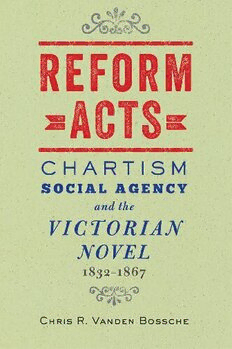
Reform Acts: Chartism, Social Agency, and the Victorian Novel, 1832–1867 PDF
Preview Reform Acts: Chartism, Social Agency, and the Victorian Novel, 1832–1867
Reform Acts This page intentionally left blank Reform Acts Chartism, Social Agency, and the Victorian Novel, 1832–1867 chris r. vanden bossche Johns Hopkins University Press Baltimore ©2014 Johns Hopkins University Press All rights reserved. Published 2014 Printed in the United States of America on acid-free paper 2 4 6 8 9 7 5 3 1 Johns Hopkins University Press 2715 North Charles Street Baltimore, Maryland 21218-4363 www.press.jhu.edu Library of Congress Cataloging-in-Publication Data Vanden Bossche, Chris. Reform acts : Chartism, social agency, and the Victorian novel, 1832–1867 / Chris R. Vanden Bossche. pages cm Includes bibliographical references and index. isbn978-1-4214-1208-5 (hardcover : acid-free paper) — isbn978-1-4214-1209-2 (electronic) — isbn1-4214-1208-X (hardcover : acid-free paper) — isbn1-4214-1209-8 (electronic) 1. English fiction— 19th century—History and criticism. 2. Social classes in literature. 3. Chartism in literature. 4. Literature and society—Great Britain— History—19th century. I. Title. pr830.s6v362014 823.009'355—dc23 2013016722 A catalog record for this book is available from the British Library. Special discounts are available for bulk purchases of this book. For more information, please contact Special Sales at 410-516-6936 or [email protected]. Johns Hopkins University Press uses environmentally friendly book materials, including recycled text paper that is composed of at least 30 percent post-consumer waste, whenever possible. To Laura This page intentionally left blank Contents Acknowledgments ix 1 Social Agency: The Franchise, Class Discourse, and National Narratives 1 part 1 making physical force moral: the dilemma of chartism, 1838–1842 2 Social Agency in the Chartist and Parliamentary Press 21 3 Egalitarian Chivalry and Popular Agency in Wat Tyler 37 4 Unconsummated Marriage and the “Uncommitted” Gunpowder Plot in Guy Fawkes 50 5 Class Alliance and Self-Culture in Barnaby Rudge 60 part 2 “the land! the land! the land!”: land ownership as political reform, 1842–1848 6 Agricultural Reform, Young England’s Allotments, and the Chartist Land Plan 75 7 The Landed Estate, Finely Graded Hierarchy, and the Member of Parliament in Coningsby and Sybil 85 8 Agricultural Improvement and the Squirearchy in Hillingdon Hall 102 9 The Land Plan, Class Dichotomy, and Working-Class Agency in Sunshine and Shadow 113 viii contents part 3 the social turn: from chartism to cooperation and trade unionism, 1848–1855 10 Christian Socialism and Cooperative Association 129 11 Clergy and Working-Class Cooperation in Yeast and Alton Locke 142 12 Reforming Trade Unionism in Mary Barton and North and South 164 Coda: Rethinking Reform in the Era of the Second Reform Act, 1860–1867 189 Notes 201 Works Cited 233 Index 245 Acknowledgments I want to express my gratitude to the many interlocutors in dialogue with whom I have written this book. These include the students in my undergraduate and graduate courses in which I posed, and we vigorously discussed, the questions explored in this study. My colleagues and thesis and dissertation students at Notre Dame contributed in many ways, in particular in discussion of portions of this work in the Eighteenth- and Nineteenth-Century British Area seminar. Count- less scholars encountered in books and articles, conferences and classrooms, have contributed to my knowledge and understanding of all things Victorian and liter- ary, whether as provokers, challengers, or affirmers. I also thank the Institute for Scholarship in the Liberal Arts at Notre Dame for financial support of this project. I made my first public presentation of ideas that I would eventually develop into this project at the first meeting of the North American Victorian Studies Association, and it has continued to be a fruitful venue for presenting the work in progress. Interdisciplinary Nineteenth-Century Studies has been especially im- portant as a model for intellectual dialogue and exchange; I am grateful to it not only for intellectual stimulation but also for the friendships that have developed over the years at its meetings. I have spent many a pleasant dinnertime recounting the chapters of this book. Always listening intently, questioning, responding, and helping me to think through problems that stymied me was my colleague, companion, and wife, Laura Haigwood, to whom I dedicate this book.
